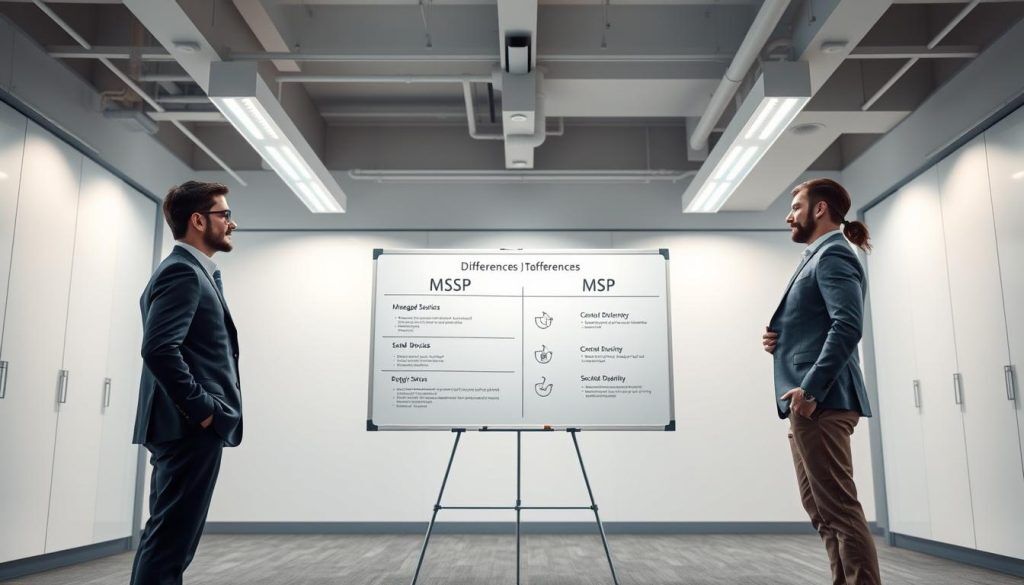Is MSSP worth IT? Evaluating the ROI for Businesses
What if the greatest threat to your business isn’t a competitor, but a gap in your own defenses? The digital landscape presents a constant challenge for organizations seeking robust security. Many companies struggle to build the internal expertise needed for comprehensive protection against evolving cyber threats.

Recent events highlight the severe consequences of inadequate cybersecurity. A global shortfall of nearly four million security professionals makes building an internal team difficult. High-profile attacks have resulted in losses exceeding $100 million and the exposure of sensitive data.
This analysis explores whether partnering with a managed security service provider delivers measurable value. We examine the true return beyond direct costs, considering reputational damage, operational disruptions, and strategic advantages. Our guidance helps business leaders make informed decisions about strengthening their security posture.
Key Takeaways
- The global cybersecurity skills gap creates significant challenges for businesses building internal teams.
- Recent high-profile attacks demonstrate the severe financial and operational impact of security breaches.
- Evaluating MSSP partnerships requires looking beyond direct costs to broader business implications.
- Professional security services can help organizations maintain focus on core business initiatives.
- Understanding the full value proposition includes risk reduction, compliance, and competitive advantage.
- Data-driven insights help business leaders align security investments with long-term objectives.
Introduction to Managed Security Service Providers and MSPs
Businesses often encounter confusion when differentiating between general IT support and specialized security services. We help clarify these distinct roles to ensure organizations select the right partnership model for their specific needs.
Defining MSSP and MSP Roles
A Managed Service Provider delivers comprehensive technology management. This includes routine maintenance, help desk support, and system optimization. Their focus remains on operational efficiency and user productivity.
Conversely, a Managed Security Service Provider specializes exclusively in cybersecurity functions. These professionals deploy advanced threat detection and maintain continuous monitoring. Their dedicated approach prevents security incidents from escalating into major breaches.
Market Trends and Cybersecurity Challenges
The demand for managed security services shows explosive growth. This trend reflects the global shortage of nearly four million cybersecurity professionals. Organizations recognize that building internal capabilities requires substantial investment.
Modern threats demonstrate increasing sophistication across all industries. Generalist IT support alone cannot address targeted attacks or complex compliance requirements. Specialized security services provide the focused protection that modern risk management demands.
We understand that these provider types serve complementary functions within your technology ecosystem. While MSPs ensure operational performance, MSSPs deliver the specialized protection that safeguards your most valuable assets.
Is MSSP worth IT? A Detailed Analysis
For business leaders weighing their options, the fundamental divergence between operational support and dedicated protection forms the core of the investment analysis. We break down this critical comparison to provide clarity on the specific value each partnership delivers.
Comparing MSSP and MSP Solutions
Managed Service Providers prioritize overall network performance and user productivity. Their services encompass general IT management, help desk support, and system administration. This model offers flexibility for organizations needing comprehensive technology oversight.

Managed Security Service Providers, however, concentrate exclusively on cybersecurity. They deploy specialized tools for 24/7 threat monitoring, intrusion detection, and vulnerability scanning. This focused approach provides a depth of expertise that general IT support cannot match.
The key differences are clear. An msp ensures your technology works efficiently. An mssp ensures it remains secure against advanced threats. Understanding this distinction is vital for selecting the right solution.
Assessing the ROI and Security Benefits
Evaluating the return involves more than just subscription fees. For a medium-sized business, an annual investment of approximately $60,000 must be weighed against the potential multi-million dollar losses from a single breach.
The security benefits are substantial. These partnerships offer proactive threat hunting and real-time incident response. This capability significantly reduces risk and ensures operational continuity, delivering value that often far exceeds the cost.
Benefits and ROI of Managed Security Services
Modern businesses require security solutions that deliver both immediate protection and long-term strategic advantages. We help organizations understand how professional partnerships create measurable value beyond basic threat prevention.
Cost-Effectiveness and Operational Efficiency
The financial benefits become clear when comparing managed security service costs against building internal capabilities. For medium-sized organizations, an approximate $60,000 annual investment contrasts sharply with the $100,000+ salary for a single cybersecurity professional.
Operational efficiency improves significantly when specialists handle complex security tasks. Your team gains freedom to focus on core business initiatives rather than daily security operations.
Enhanced Access to Advanced Security Technologies
Partnerships provide immediate access to enterprise-grade security technologies that would require substantial capital investment. These include next-generation firewalls, threat intelligence platforms, and advanced detection systems.
The technology advantage extends beyond initial deployment to include continuous updates and emerging capabilities. Your defenses evolve alongside the threat landscape without constant internal evaluation and purchasing.
| Security Approach | Initial Investment | Ongoing Management | Technology Access |
|---|---|---|---|
| Internal Team Building | High capital expenditure | Significant staff time | Limited by budget |
| Managed Security Service | Predictable subscription | Provider responsibility | Enterprise-grade tools |
| Hybrid Model | Moderate investment | Shared responsibility | Balanced access |
These partnerships deliver comprehensive protection capabilities that safeguard sensitive data and business operations. The return on investment includes risk reduction, compliance support, and strategic advantages that justify the ongoing service commitment.
Comparing MSSP and SOC: Which Approach Fits Your Business?
Determining the optimal security structure requires a clear understanding of the core models available. We help businesses navigate the choice between an external security service provider and an in-house Security Operations Center.
Each path offers distinct advantages tailored to different organizational needs and resources.
Pros and Cons of Outsourced vs. In-House Security
An external managed security service provider delivers immediate access to expert teams and advanced technology. This approach offers predictable pricing and rapid deployment. It provides robust threat detection and 24/7 monitoring capabilities.
Building an internal SOC requires significant investment in recruiting and technology. The deep organizational knowledge of an in-house team allows for highly customized response strategies. This model offers complete control over data and security operations.
Hybrid Models for Comprehensive Protection
Many organizations now adopt a blended approach. This model leverages the scalability of external providers for continuous monitoring. It maintains an internal team for complex incident response and strategic planning.
This hybrid method balances cost efficiency with specialized internal oversight. It ensures comprehensive coverage across all security systems.
| Security Approach | Cost Consideration | Expertise Level | Operational Control |
|---|---|---|---|
| External Service Provider | Predictable subscription | Broad experience | Shared responsibility |
| In-House SOC | High capital investment | Deep organizational knowledge | Complete internal control |
| Hybrid Model | Balanced investment | Combined strengths | Strategic internal oversight |
Selecting the right security approach depends on your organization’s specific risk profile and compliance requirements. We recommend evaluating each model against your long-term operational goals.
Key Considerations for U.S. Businesses When Selecting a Provider
U.S. businesses face complex decisions when choosing security providers, with regulatory compliance and scalability emerging as primary considerations. We help organizations navigate these critical factors to establish effective partnerships.
Regulatory Compliance and Data Protection
American organizations must address specific compliance frameworks like HIPAA and PCI DSS. Your security service provider should demonstrate understanding of these requirements.
We evaluate how providers handle sensitive data and maintain proper controls. Third-party audits and certifications like SOC 2 provide essential validation of their capabilities.
Scalability and Support for Growing Organizations
Managed security services must accommodate business growth without disruption. Flexible service models ensure continuous protection during expansion phases.
We prioritize providers offering transparent pricing and dedicated support teams. These elements create sustainable security partnerships for evolving organizations.
| Selection Factor | Compliance Requirements | Scalability Features | Support Capabilities |
|---|---|---|---|
| Regulatory Adherence | Industry-specific certifications | Multi-location coverage | 24/7 monitoring |
| Data Protection | Encryption standards | Volume accommodation | Rapid response |
| Contract Clarity | Documentation practices | Flexible terms | Performance metrics |
These considerations help businesses select providers that meet both current needs and future growth requirements.
Innovations and Future Trends in Managed Security Services
Emerging technologies are reshaping how organizations approach threat detection and response strategies. We observe continuous evolution in managed security services as providers integrate cutting-edge capabilities.

Advancements in Threat Hunting and Incident Response
Modern threat hunting has transformed from reactive monitoring to proactive investigations. Security professionals now use advanced analytics to identify sophisticated attack campaigns before they cause damage.
Incident response capabilities have seen remarkable improvements. Automated tools can isolate compromised endpoints within seconds of threat detection. This rapid response significantly reduces attacker dwell time.
The Impact of AI and Machine Learning on Cybersecurity
Artificial intelligence and machine learning technologies are revolutionizing cybersecurity operations. These systems analyze massive data volumes to identify subtle anomalies indicating sophisticated attacks.
Predictive analytics help identify vulnerabilities before exploitation occurs. Behavioral analysis establishes normal activity baselines and flags deviations that may indicate insider threats.
These innovations enable managed security service providers to offer capabilities that would be cost-prohibitive for individual organizations. The integration of advanced technologies ensures comprehensive protection against evolving threats.
Conclusion
As organizations navigate the complex cybersecurity terrain, the choice between various protection models represents one of the most significant strategic decisions facing modern business leaders. We have demonstrated that managed security services deliver substantial value through specialized expertise and advanced threat detection capabilities.
The evidence clearly supports these partnerships for companies lacking dedicated security teams. These solutions provide comprehensive network protection, continuous monitoring, and compliance support. The operational benefits extend beyond basic threat prevention to strategic advantages.
We recommend careful evaluation of your organization’s specific needs and risk profile. The right security approach balances protection requirements with available resources. This ensures your business operations remain secure against evolving threats while maintaining focus on core objectives.
FAQ
What is the primary difference between an MSP and an MSSP?
The key difference lies in their core focus. A Managed Service Provider (MSP) concentrates on maintaining and managing your IT infrastructure, such as networks, servers, and workstations, to ensure operational uptime. A Managed Security Service Provider (MSSP) specializes in cybersecurity, offering continuous threat monitoring, detection, and response services to protect your data and systems from advanced threats. While an MSP keeps your technology running, an MSSP actively defends it.
How can a managed security service provider improve our company’s threat detection capabilities?
We enhance your threat detection by providing 24/7 security monitoring using advanced Security Information and Event Management (SIEM) tools and Extended Detection and Response (XDR) platforms. Our team of experts analyzes security alerts in real-time, identifying potential incidents that internal teams might miss. This proactive approach to threat hunting significantly reduces the time between a breach occurring and its containment, minimizing potential damage.
For a growing business, is building an in-house Security Operations Center (SOC) a better option than partnering with an MSSP?
Building and maintaining an internal SOC requires a substantial, ongoing investment in specialized talent, advanced technology, and continuous training. For most growing organizations, the cost and operational burden are prohibitive. Partnering with an MSSP offers immediate access to enterprise-grade security solutions and a dedicated team of experts at a predictable cost. This model provides scalability, allowing your security posture to grow seamlessly with your business without the capital expenditure.
What role does regulatory compliance play when selecting a security service provider?
Compliance is a critical factor. A qualified provider will have deep expertise in frameworks like HIPAA, PCI DSS, SOC 2, and GDPR. We help ensure your security controls and reporting meet specific industry requirements, simplifying audits and reducing compliance risks. This support is essential for protecting sensitive data and maintaining customer trust, especially for businesses in highly regulated sectors like healthcare and finance.
How do managed security services incorporate innovations like AI and machine learning?
We leverage artificial intelligence and machine learning to analyze vast amounts of data for anomalous patterns indicative of cyber threats. These technologies automate the initial stages of threat detection, enabling faster response times than manual processes alone. This intelligent automation enhances our threat hunting and incident response capabilities, allowing our security analysts to focus on complex investigations and strategic improvements to your security posture.

